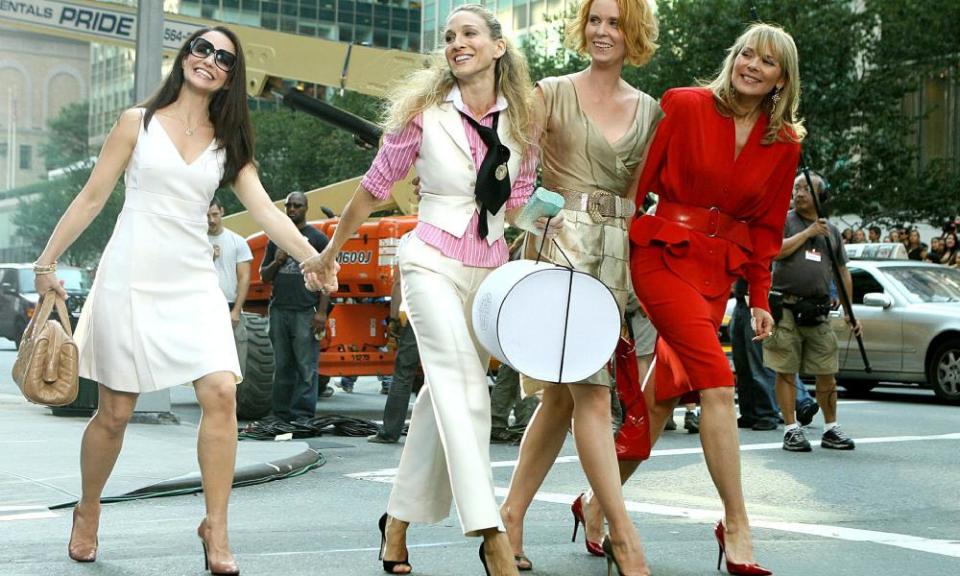Candace Bushnell: ‘It seems like every generation has to relearn feminism’

She is famous for putting the sex lives of women firmly centre stage. Now, Candace Bushnell, author of Sex and the City and the inspiration for Carrie Bradshaw, has written a new novel based on her own experiences of inappropriate male behaviour, inspired by #MeToo.
Rules for Being a Girl, which will be published next month, is Bushnell’s first work of fiction aimed at young adults. In it, a teen’s life is turned upside down when her high school teacher attempts to kiss her, mirroring Bushnell’s own experience at college, when professors making passes at her was “a regular occurrence”.
Bushnell told the Observer she and her co-author, the feminist teen writer Katie Cotugno had been inspired by the #MeToo movement and the real lives of teenage girls today. “It’s more overtly feminist than my other books. There’s an openness to these kinds of stories that wasn’t there 10 years ago ... In the past, if you wanted to write something that was more feminist, you were highly discouraged by publishers.”
Now, more than 25 years since she started writing the column in the New York Observer that would become the smash-hit book and TV series, it is a more acceptable theme, she says. “It’s something that young women are much more aware of. It seems like every generation has to relearn feminism.”
If she were writing Sex and the City today, there would be much more discussion of #MeToo in there, she says. “But it reflected the time we were in … When I was writing Sex and the City back in the 90s, if you were a 30-something single childless woman, you were considered a bit of an outcast. And now, we consider that woman as the norm, as 50% of their demographic. We don’t consider those women freaks.”
Bushnell, who was born in Connecticut in 1958 and moved to New York in the 1970s, never had children herself and says she has never regretted her decision. “The opposite is true,” she wrote on Twitter last year in response to a particularly gloating MailOnline headline.
Her new book tries to warn girls born in the 21st century about the challenges they may face, in particular the sexist behaviour they encounter at school. “One of the things the book captures is typical high-school sexism. It can be a place that’s very regimented in terms of what’s acceptable behaviour for each sex,” Bushnell said.

The protagonist, Marin, for example, begins to question the way her boyfriend and his friends treat her and how all the books she reads are by “old white men”. She starts a feminist book club at her school and publishes an article in her school paper, outlining the contradictory rules teenage girls are expected to live by. “I think this is a book that hopefully, teenage girls will put down and say: ‘hmm, this is something to think about, this is something to discuss’,” she said.
Bushnell says that, as a young woman, she had her “fair share” of powerful men propositioning her: “It didn’t happen to me in high school, but it did happen quite a bit in college ... And it used to happen in the workplace all the time – to me, and to pretty much every other woman I know.”
She began to notice a pattern in the behaviour of these men, which she details in her novel: “It always starts off with a little tiny thing, like they ask for a kiss or they try and get you alone. And you think: ‘oh well, maybe that’s OK.’ And then it goes a little bit further. And a little bit further.”
People often think: 'Oh, it will never happen to me' … but at first it's so subtle
At the time, she says, “you didn’t do anything about it. You just tried as politely as possible to say no, without pissing them off. Because if they got pissed off, that’s it.” These men were quite capable of handing out punishments to women who refused to sleep with them: “It was pretty common actually, for professors to have sex with their students ... [if you refused] they could give you bad grades and that kind of thing.”
She wanted to reflect those experiences in Rules for Being a Girl, to prepare young women for the encounters they may face: “It’s about being aware of these kinds of behaviours. It can happen to anybody. People often think: ‘oh, it will never happen to me’ but at first it’s so subtle ... And if it wasn’t for #MeToo, it would probably still be going on.”
She thinks people are much more aware of what’s unacceptable behaviour now and women feel more empowered to call it out: “Whereas before, it was hushed up. You were told: don’t say anything.”
For example, in publishing, there was often pressure on female writers to sleep with the editor, she says. “Getting the job in some way required stroking this guy’s ego. I’m not interested in doing that. Stroke my fucking ego. That’s my feeling.”

 Yahoo News
Yahoo News 
